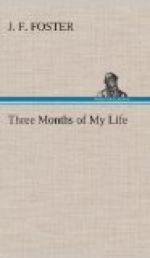July 15th.—Started as soon as it was light for Gingle, fourteen miles distant. Road greatly improved, hilly of course, but tolerably smooth so that one could get on without clambering. About half way passed Dorie on the left bank of the river, where there is another fort and a strong rope bridge, it is one of the halts on the Murree road, farther on came to an old ruin, four thick walls perforated by arches enclosing an open square in the middle of two of the sides, large masses of masonry formed archways or entrances. It is built of the rough stones and boulders with which the surface of the ground is covered, yet the arches are of very good shape. On the opposite bank of the Jhelum there are forests of Deodar, but though they grow down to the waters edge, there is not one on this side. (Larix Deodora, called by the Hindoos, “the God Tree” is a stately pine, growing to a great height, and of a very gradual and elegant taper. Its foliage is of the darkest green colour, and it gives the mountains a very sombre appearance.) The hills have become much more rugged and abrupt. I know of no single condition which gives a scene so great an aspect of wildness and desolation, as dead fir trees. There they stand on the most barren and inaccessible places, rearing their gaunt and whitened forms erect as ever, and though lifeless yet not decayed. Seared and blasted by a thousand storms, they stand stern and silent, ghostlike and immoveable, scorning the elements. No wind murmurs pleasantly through their dead and shrunken branches, the howling tempest alone can make them speak, and then with wild straining shriek and harsh rattle, they do battle with the whirlwind. It was getting hot and I was thinking of my dandy, when a storm passed over with heavy rain. This was a mitigated evil (if an evil at all for my bed remained dry, and a wet bed is the worst result of a shower) as it rendered walking cool and pleasant. It cleared up again, and I rode the last half mile. The cleanest and best bungalow here I have been in since I left Ghuri. The view down the valley is extremely pretty, hills rising one above the other, but shut in on all other sides by high mountains. Gingle, which is only one or two huts, stands on a small plateau a quarter of a mile long by one hundred and fifty yards wide, fifty feet above the Jhelum. The ground is laid out in paddy fields irrigated by a stream of the coolest and purest water. It is a great satisfaction to be able to drink water freely without fear. In the plains of India the water is so contaminated as to be almost poisonous, and I do not think that previous to this march I had drank a gallon of it since I landed in Calcutta.




